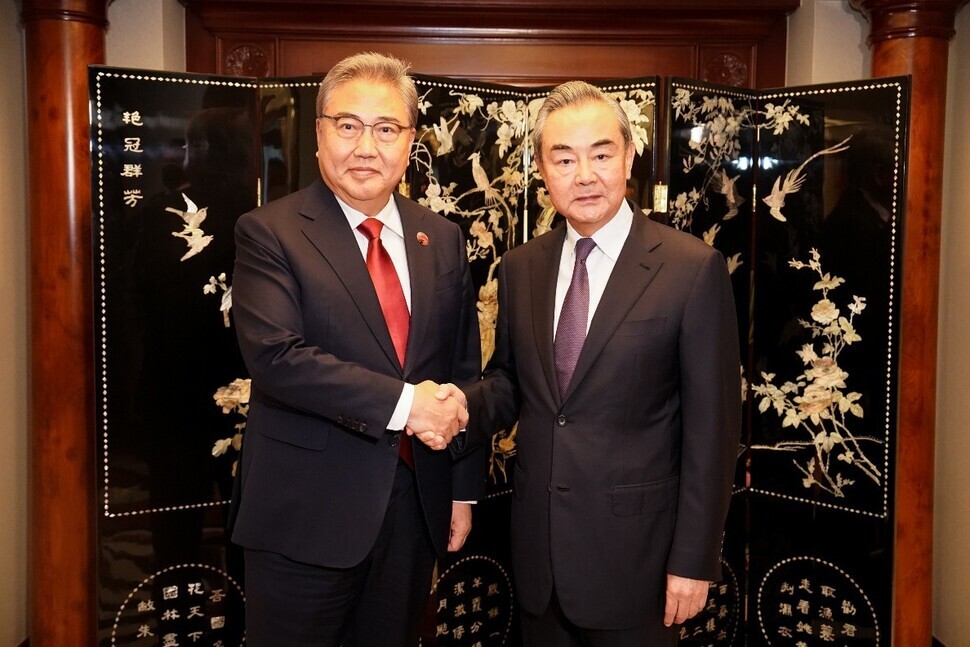hankyoreh
Links to other country sites 다른 나라 사이트 링크
S. Korea, China pledge to strengthen communication amid chill in ties

Relations between China and South Korea seem to have avoided further deterioration after South Korean Foreign Minister Park Jin met with Wang Yi, one of China’s top diplomats, and pledged to strengthen communication between their two countries.
China-South Korea relations became even frostier last month after the Chinese ambassador to South Korea made controversial remarks about Seoul’s handling of its ties with Beijing.
However, China has repeatedly raised the issue of Taiwan and emphasized its “One China” principle, which suggests that Korea will need to further refine its foreign policies with the US and China going forward.
Park and Wang spoke for 45 minutes in Jakarta, Indonesia, on the sidelines of the Association of Southeast Asian Nations (ASEAN) foreign ministers’ meeting on Friday.
During the meeting the two agreed to strengthen bilateral communication and exchanges at various levels through foreign affairs and national security dialogue, vice minister-level strategic dialogue, and 1.5-track bilateral dialogue.
The Ministry of Foreign Affairs stated that Park had expressed “hope that South Korea and China will continue to develop friendly relations based on the spirit of harmonizing but maintaining differences and virtue,” to which Wang responded positively.
The Chinese Foreign Ministry also shared on Saturday that Wang said that the “two sides should leverage their geographical proximity, economic integration and cultural connectivity, dispel disturbances, resume exchanges at all levels and firmly advance mutually beneficial cooperation.”
In the context of the conflict between China and the US, “dispelling disturbances” means that Seoul should not join Washington in keeping China in check, but rather lead its own bilateral relations with Beijing.
China broached the topic of Taiwan during the meeting as well.
“The Taiwan issue is at the very core of China's core interests, and bears on the political foundation and basic trust in China-South Korea relations,” Wang said, adding that "we hope that South Korea will abide by the One China principle and handle it prudently and properly.”
These comments seem to have been mindful of President Yoon Suk-yeol’s interview with Reuters in April in which he stated that the Taiwan issue “is not simply an issue between China and Taiwan but, like the issue of North Korea,” calling it “a global issue.” In the same interview, Yoon said that he opposes “changes to the status quo by force.”
In response, the South Korean Foreign Ministry stated that Park emphasized South Korea’s basic position of respecting the One China principle, while calling peace and stability in the Taiwan Strait “important.”
Park reportedly conveyed regret to Wang about the comments that the Chinese Ambassador to South Korea Xing Haiming made in June, “that anyone who is currently betting on China’s defeat will certainly come to regret that,” while speaking with Lee Jae-myung, the leader of the top opposition Democratic Party, at his official residence.
However, neither Park nor Wang mentioned Xing’s remarks in their statements on the outcome of the meeting and refrained from using harsh language.
“It’s positive that both South Korea and China agreed on the need for basic communication and met at a high level,” said Moon Heung-ho, a professor at Hanyang University's Graduate School of International Studies, “but it does not mean that the conflict between the two countries has been resolved.”
“It’s important for Korea to have an unbiased strategic approach to the US and Japan, as the close relationship between South Korea, the US, and Japan is a variable in the relationship between South Korea and China,” added Moon.
By Jang Ye-ji, staff reporter; Shin Hyeong-cheol, staff reporter
Please direct questions or comments to [english@hani.co.kr]

Editorial・opinion
![[Editorial] Intensifying US-China rivalry means Seoul must address uncertainty with Beijing sooner than later [Editorial] Intensifying US-China rivalry means Seoul must address uncertainty with Beijing sooner than later](https://flexible.img.hani.co.kr/flexible/normal/500/300/imgdb/original/2024/0517/8117159322045222.jpg) [Editorial] Intensifying US-China rivalry means Seoul must address uncertainty with Beijing sooner than later
[Editorial] Intensifying US-China rivalry means Seoul must address uncertainty with Beijing sooner than later![[Column] When ‘fairness’ means hate and violence [Column] When ‘fairness’ means hate and violence](https://flexible.img.hani.co.kr/flexible/normal/500/300/imgdb/original/2024/0516/7417158465908824.jpg) [Column] When ‘fairness’ means hate and violence
[Column] When ‘fairness’ means hate and violence- [Editorial] Yoon must stop abusing authority to shield himself from investigation
- [Column] US troop withdrawal from Korea could be the Acheson Line all over
- [Column] How to win back readers who’ve turned to YouTube for news
- [Column] Welcome to the president’s pity party
- [Editorial] Korea must respond firmly to Japan’s attempt to usurp Line
- [Editorial] Transfers of prosecutors investigating Korea’s first lady send chilling message
- [Column] Will Seoul’s ties with Moscow really recover on their own?
- [Column] Samsung’s ‘lost decade’ and Lee Jae-yong’s mismatched chopsticks
Most viewed articles
- 1[Editorial] Transfers of prosecutors investigating Korea’s first lady send chilling message
- 2For new generation of Chinese artists, discontent is disobedience
- 3[Photo] 1,200 prospective teachers call death of teacher “social manslaughter”
- 4[Exclusive] Unearthed memo suggests Gwangju Uprising missing may have been cremated
- 5[Column] Samsung’s ‘lost decade’ and Lee Jae-yong’s mismatched chopsticks
- 6[Column] When ‘fairness’ means hate and violence
- 7Xi, Putin ‘oppose acts of military intimidation’ against N. Korea by US in joint statement
- 8S. Korea “monitoring developments” after report of secret Chinese police station in Seoul
- 9[Special reportage- part I] Elderly prostitution at Jongmyo Park
- 10[News analysis] Samsung in management crisis due to owner risk